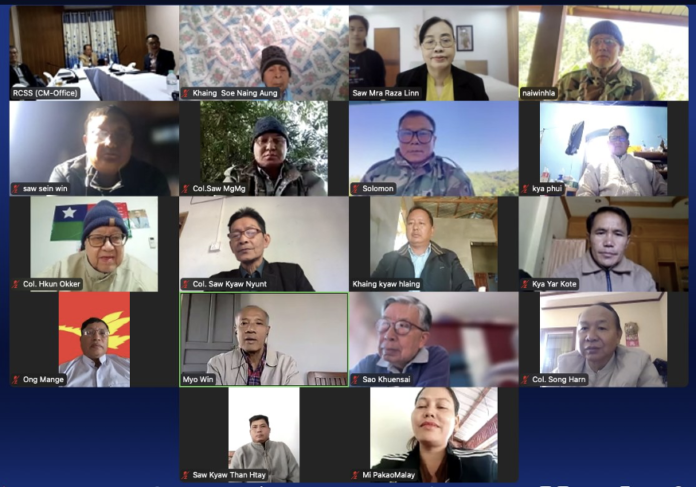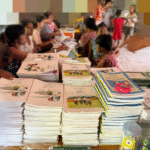An interview with Col. Saw Kyaw Nyunt, spokesperson for 7 EAO Alliance, on their plans to expand the scope of political engagement.
The 7 EAO Alliance, a coalition of seven Ethnic Armed Organizations that signed the Nationwide Ceasefire Agreement (NCA), announced during their online steering meeting that they will enhance their political engagement processes within the country.
Among the key points discussed at the meeting was the objective of facilitating a political dialogue involving all relevant stakeholders.
Than Lwin Times interviewed Col. Saw Kyaw Nyunt, spokesperson for the 7 EAO Alliance, to find out more about what exactly is meant by “all relevant stakeholders” mentioned in the discussions, whether a specific timeline has been set for conducting this all-inclusive political dialogue, and the planned processes for expanding political engagement.
Q: The meeting statement mentions political dialogues that include all stakeholders. Who exactly are these stakeholders you’re referring to?
A: Yes, that’s right about the statement from our third 7 EAO Alliance steering meeting. Our country has been facing what you may call challenges or crises over these past two years. So, we the 7 EAO Alliance believe that since these problems are political in nature, finding solutions through political dialogue is the way forward. It’s really the best option for our Union that’ll cause the least harm and suffering.
When we talk about inclusive dialogue with all stakeholders, to overcome our current difficulties, we need to think about who needs to be at the table. The main thing is, to overcome these challenges, we need to work towards building a federal democratic union. When we say democracy, we need people and organizations with strong public support. And when we talk about federalism, we understand this must include other legitimate stakeholders, including the ethnic armed organizations.
When we’re discussing building a federal democratic union, on the democracy side, we need all relevant organizations and individuals who should be part of it. And when we talk about federalism, we need ethnic political organizations who deserve to be there. What we mean is all those organizations and individuals who absolutely must be included – those who we can’t move forward without talking to, meeting with, and having on board to overcome our current challenges.
Q: Have you set any specific timeframe for holding these all-inclusive political dialogues?
A: In our country right now, the scope of military engagement has become extremely expansive while that of political engagement has shrunk to almost nothing. So this dialogue we’re talking about – it’s happening at a very unfavorable time. We’re facing major challenges and difficulties. The nature of dialogue requires participation and cooperation from all relevant sides. Since it’s crucial that this process be implemented on equal terms, I think the timing and content of discussions can only emerge through prior consultation and mutual agreement among all of us.
Q: You’ve mentioned plans to expand the current scope of political engagement in the country. How do you plan to put this into action?
A: Since our steering meeting in September, we’ve realized that our current path toward achieving political dialogue isn’t working. So at our steering meeting, we identified two main areas of work. First, there are tasks we need to do within our 7 organizations. Second, there’s work we need to do with external groups. For the internal part – among our 7 organizations – we need to establish solid federal principles within our alliance. We also need to work toward developing state constitutions for each state, and find ways to enhance our humanitarian assistance efforts, and so on. That’s what we need to do within our 7 organizations. As for working with external forces, we need to approach other ethnic armed organizations and try to work together with them. That’s one process.
We also understand that to overcome our country’s current crisis, we can’t ignore international support. So we need to try to engage with ASEAN leaders, and work on establishing connections with leaders and organizations from China, India, and Thailand to collaborate on overcoming Myanmar’s current political crisis and challenges. We’ve discussed and coordinated on these points that we need to implement.
Q: Who exactly do you mean by external ethnic brothers?
A: We’re not focusing on whether there are battles with the military council or not. What we’re focusing on is this – our country has been facing a crisis for over four years now. The people have sacrificed so much. What we’re talking about is our desire to reach out and engage with all individuals and organizations we need to talk to, to find a way out of this situation where our people are losing their lives, homes, and property to destruction and fire.
Sent by Than Lwin Times


